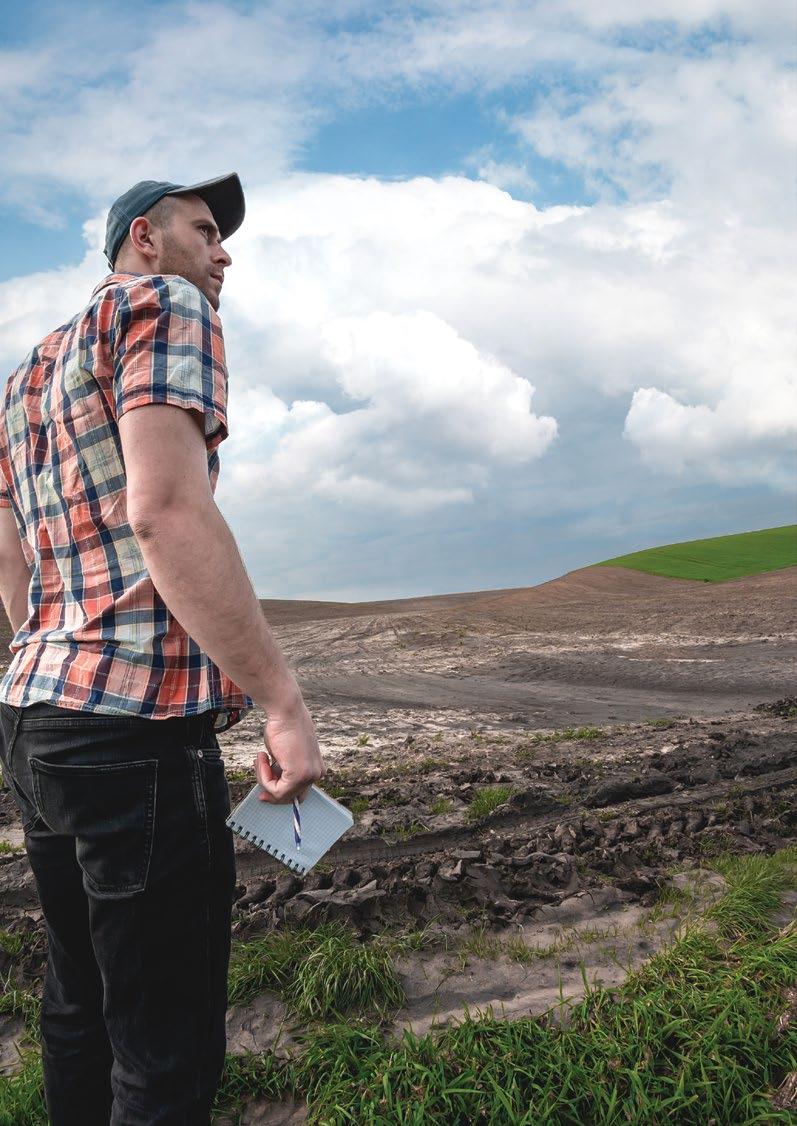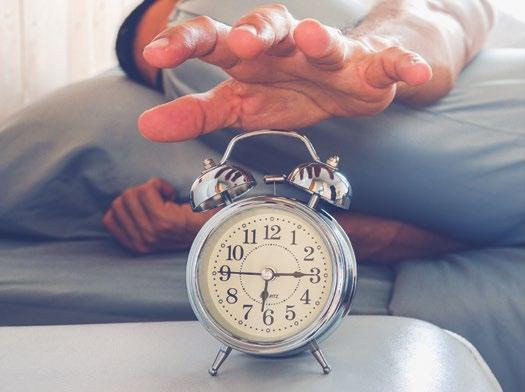
11 minute read
YOUR HEALTH


Advertisement

Decision making under pressure f DECISIONS made under challenging circumstances can certainly cause us and those around us a bit of stress … this is normal!

BY REGIONAL MEN’S HEALTH
We make decisions every single day, sometimes without even knowing it, these are often the easy and simple decisions that are part of our routine of daily life. Decisions that are of a more complex nature, involve more risk, or a decision that must be made under challenging circumstances can certainly cause us and those around us a bit of stress … this is normal!

Being in a position to make a decision is a good thing. For many people making decisions may not be an issue; I’m sure we have all met someone who seems confident, sure of themselves and likes to be in control and take charge of situations and the decisions that go with it. While others may be a little more indecisive, seek advice or approval first, or maybe just need a little more time to think things through. Regardless of which end of the scale we are at, it is a positive to be able to make decisions, as this means at least two things; 1 We are in a position to have a say, make a choice and be in control; and 2 We are not procrastinating.
Why do some of us struggle with decision making and what factors can impact this?
There are many things at play that can influence and impact on our decision making and listed below are a few examples. Uncertainty
No matter who we are or what we do, none of us know which way the dice will roll. None of us want to make the wrong decision, but sometimes this cannot be avoided (weather, fires, floods, droughts, bureaucracy).
Complexity
This can depend on the nature of our business or situation, i.e. farming involves many different interrelated factors that quite often need to be considered (financial, weather, equipment, labour, cost/price).
Consequences
Something we have all tasted at one stage or another, both good and bad. We still need to consider the consequences — Risk vs Reward.
Alternatives
Have we considered them? Where do we get our information from to inform us of all available options?
Interpersonal issues
Who else is affected by our decisions, how will others react? What frame of mind are we in when making decisions? What else do we have going on in our lives, what are our priorities?
So, what can we do to help this process?
• Try and create a positive space; • Remember the 6 Ps — Prior Planning Prevents
Piss Poor Performance; • Be realistic and look at all the factors impacting on our circumstance; • The grass is not always greener. Don’t be influenced by what others are doing or will think; • Stick to a plan/process that you are comfortable with.
It’s important to remember that when we make a decision it’s often based on the best information we have at the current time. Letting go of making a wrong decision is vital. This can be hard for some people however over-thinking the could of/should of/ would of does not get us anywhere. Stay committed to your decisions but stay flexible with your approach.
f BEING in a position to make a decision is a good thing.
MORE INFORMATION
The Regional Men’s Health Initiative delivered by Wheatbelt Men’s Health (Inc): Phone: (08) 9690 2277 Email: menshealth@4blokes.com.au
www.regionalmenshealth.com.au

Small business mental health service extended for those impacted by COVID-19 and natural disasters

f NEWACCESS is available via phone, video call from Monday to Friday 8am to 8pm AEST.
BY BEYOND BLUE
Beyond Blue has welcomed the Federal Government’s announcement to continue its NewAccess for Small Business Owners service to December 2022.
The $4.1 million in additional funding for the service means Beyond Blue can continue supporting the mental health and wellbeing of small business owners impacted by the pandemic and natural disasters beyond 1 April to 31 December, 2022. Beyond Blue Chair The Hon Julia Gillard AC thanked the Australian Government for continuing to support a highly accessible service that has already helped many small business owners better manage the stresses caused by the uncertainty of recent times. “The Federal Government’s announcement comes at a time when the COVID-19 omicron variant is placing further pressure on small businesses, which are experiencing workforce shortages, supply chain issues and impacts on patronage,” Ms Gillard said. “Beyond Blue welcomes the government’s funding extension for our NewAccess for Small Business Owners service so we can continue to support the mental health of people who contribute enormously to the wealth of our nation and currently face many stresses. “We are honoured to be given the responsibility to provide this innovative, free service that offers personalised mental health coaching by people who themselves have a small business background.” The funding extension will support an additional 2,565 small business owners and the hiring of an extra six mental health coaches via delivery partner Richmond Fellowship Queensland.
NewAccess for Small Business Owners offers a course of one-on-one sessions with coaches who have been trained in self-guided treatment called low-intensity cognitive behavioural therapy.
All coaches have a background in small business and are trained to deliver this evidence-based support with clinical supervision. The service minimises barriers to accessing mental health support. It is free, requires no doctor’s referral, and is available out of usual business hours by telehealth (telephone or online). “By using coaches who have lived and breathed small business, small business owners can be reassured they’re talking to someone who has been in their shoes,” Beyond Blue CEO Georgie Harman said. “Timely access to affordable mental health support can be the difference
between someone quickly getting back on their feet or sliding further into a dark place. NewAccess for Small Business Owners offers a practical approach to problem-solving and participants overwhelmingly sing its praises.” Since launch in March 2021, the program has supported more than 1,200 small business owners and delivered more than 4,200 coaching sessions. Ninety-one per cent of people surveyed after using the service said they would recommend the program to other small business The program has supported more than 1,200 small business owners since its launch. owners, 86 per cent felt more productive and able to address future business challenges and 89 per cent felt equipped to address similar difficulties in the future if they arise. Seven out of 10 users recovered against clinically validated measures. Beyond Blue thanks the Australian Small Business and Family Enterprise Ombudsman Bruce Billson, The Council of Small Business Australia, and state and territory small business Commissioners for their ongoing support of the service.
MORE INFORMATION
To find out more about NewAccess for Small Business Owners, phone 1300 945 301 or visit beyondblue.org.au/get-support/
newaccess/newaccess-for-small-businessowners
How to stick to your goalsso your motivation won’t fade
BY RURAL WEST
With another year in the rear-view mirror, it’s a great time to set new goals for the year and beyond. Fresh year, fresh start.
But how can we ensure we will stick to our goals and our motivation won’t fade out?
Start small
Small, incremental changes are often a more successful way to achieve goals and are the basis of the ‘Nudge Theory’. This theory encourages behaviour change through positive reinforcement and indirect suggestions as people are more likely to do what is good for them, if the better choice is easier. Google creating a gentle nudge to help achieve goals, such as getting fit to run an upcoming race. Equally, scheduling new habits for after an event (e.g family holiday) that could disrupt your motivation to reach your goals. If there are aspects of work (or play) that are difficult, consider if nudges might work to make the tasks easier to accomplish.
f SMALL, incremental changes are often a more successful way to achieve goals. workplaces wanted to improve employee well-being by encouraging healthier choices of meals — yes less Big Macs, more rabbit food.

They implemented nudges to encourage healthier eating by putting the healthier choices in the first seen and easiest to access places. It is just a nudge, the alternative less healthy options are still available (it is America), but with this nudge on average employees chose healthier options more often. If you want to start getting up earlier, a gentle nudge could be setting an alarm which is out of reach of your bed. If you have to get out of bed to turn it off, you can minimise the temptation of hitting snooze.
Start at the right time
Evidence has shown aligning stages in our resolutions to events of significance to us (birthdays, annual celebrations) makes it more likely we will act —
Clear vision
While this may seem obvious, apparently it can (and often does) get lost along the way! Aligning your values with your goals. What do you value most? Is it financial freedom or more time with the family? Asking yourself these questions and defining what matters most to you, can help clarify what your biggest goal is and the value in achieving it. Alignment of values and strategic goals engages the client with a future they personally value. This enhances rapid adoption of change and enables clients to be independent and forward-thinking.
Review and refine
Inevitably things change so it is important to look back, review and refine your goals along the way against your objectives and values. Making better use of our nudges can help counter our natural biases that work against us.
MORE INFORMATION
Supported by the State and Federal governments, Rural West works with a wide range of primary producers and regional small business owners to improve their position and profitability. Contact Rural West on 1800 612 004 or via email enquiries@ruralwest.com.au.
My health and wellbeing Who’s responsible?
BY REGIONAL MEN’S HEALTH INITIATIVE
We’re often told, if unwell, get to the doctor and they will deal with our health and wellbeing issue.

The doctor will often give a diagnosis, treatment options and other assistance through referrals and follow up. But it is us as individuals that must make decisions and take action, which ultimately drives the outcome. Based on some American research it is important to remember that one of the biggest determinants on our health (70%) are the decisions we make regarding wellbeing and lifestyle choices. It goes on to say that the remaining factors can vary between: • Genetics: It’s important to know family history and our vulnerability to certain illness/disease. • Environment: What we are exposed to (trauma, poverty, stressors). Living and working in regional WA can be tough dealing with such things as isolation, extreme climates and working with machinery. • The health system: Tyranny of distance and a lack of male friendly services exacerbates this.
Undoubtedly the major impact is lifestyle choices! Reinforcing our takeaway message… my health and wellbeing is my responsibility…
We say our overall health and wellbeing is made up of physical, mental and social/spiritual aspects and to maintain all three, we as individuals need to be the driver. Whether dealing with situational distress, physical health problems, a diagnosed mental illness or an issue impacting our social/spiritual wellbeing
f MAKE an appointment with your GP to discuss your individual risk factors.
(challenges around identity, meaning and purpose or our sense of belonging), the doctor will provide the framework to follow but decisions and changes ultimately need to be made by us. Making informed decisions are a part of life, whether it’s to do with family, work and social activities. Why then should our health and wellbeing be any different? Blokes in general are action orientated but making decisions and acting on things that can negatively impact our wellbeing can be put off. The warrior attitude is an admirable attribute, especially when dealing with sporting, business or seasonal adversity. However, this same attitude can lead to negligence and not putting ourselves first. We have all seen the numerous health campaigns: “A simple test could save your life”, “Don’t delay” or “Know your score”, but we also constantly hear similar comments from blokes when discussing health and wellbeing issues: • It won’t happen to me/she’ll be right. • We know the issues, but we don’t want to show ourselves as the only one with a problem. • I will just see how it goes (the back pain I’ve had for six months). The buck stops with us blokes to be the decision maker on health and wellbeing issues — it’s not the doctor’s, wife’s or employer’s responsibility, but ours! Remember the three Cs of life: Choices, Chances, Changes. You must make a choice to take a chance, or your life will never change. Diet, exercise and sleep are three areas you can start making some simple changes to help improve your health and wellbeing outcomes and remember a routine service visit could reduce the risk of some expensive repairs down the track. Make an appointment with your GP to discuss your individual risk factors; don’t wait till it becomes a chronic health problem.
MORE INFORMATION
The Regional Men’s Health Initiative delivered by Wheatbelt Men’s Health (Inc): Phone: (08) 9690 2277 Email: menshealth@4blokes.com.au
https://regionalmenshealth.com.au/








